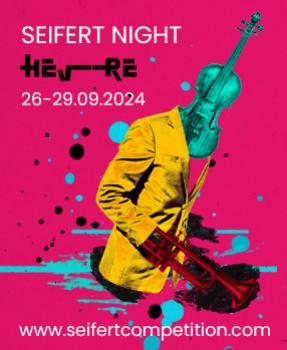
KRAKOW JAZZ WEEK: Seifert Night
Seifert Night 26-29.09.2024, Hevre club, Beera Meiselsa 18, 31-058 Kraków
Although the Seifert Competition and Seifert Jazz Days are extremely important events in terms of popularizing the work and profile of Zbigniew Seifert, they do not exhaust the list of activities undertaken in this direction by the organizers. For many years, thanks to the efforts of the creators of the Krakow events, concerts devoted to Seifert's work have been held around the world, during which artists who are winners of the competition present themselves. This series of performances is collectively known as Seifert Night.
During this year's edition of Krakow Jazz Week, events held under the Seifert Night banner will last not one, but four nights. Their shape will be slightly different than before. Usually artists present their own music and that of the competition's patron outside Poland. This time, musicians from home and abroad will present their own perspective on the legacy of the Krakow violin genius to audiences in Zbigniew Seifert's hometown. These will not always be the violinist's works played straight, after all, in jazz and improvised music, beyond the realm of interpretation, there is also plenty of room for live inspiration and room for improvisation.
The last few evenings of September, on the stage of Krakow's Hevre club, will belong to:
26.09.2024 Eduardo Bortolotti Quintet
The group is led by the Mexican violinist and composer, winner of the 2022 Seifert Competition Audience Award.
The ensembles included musicians from South America and Poland. The Mexican-Colombian-Polish group creates music as colorful as can be expected from such an exotic mix of instrumentalists. Influences of jazz and European improvised music blend with swagger with Latin American rhythms and fiery motifs drawn from Central American musical folklore. The quintet definitely focuses on sounds brimming with temperament and performed with natural freedom and great imagination.
27.09.2024 Gabriel Vieira / Jaroslaw Bester / Mikolaj Sikora
A trio formed especially for this year's Seifert Night. The international lineup consists of a Brazilian violinist, composer and arranger, winner of second place at the 2022 Seifert Competition, and two acclaimed Krakow musicians: accordionist Jaroslaw Bester and double bassist Mikołaj Sikora.
Each of the three musicians has a wealth of experience in both jazz and improvised music, but also shows inclinations to draw on elements of the traditions of various musical cultures. The folklore of South America and Eastern Europe, Jewish music and many others, combined on the ground of excellent instrumental technique and great sensitivity to the beauty of sounds, can certainly be a hallmark of the group.
28.09.2024 Nene Heroine
A quartet formed by Tri-City musicians who decided to hide their identities under fancy pseudonyms, which aptly corresponds to the perverse nature of the band's music. In Nene Heroine's work, jazz improvisation meets psychedelic rock, and techniques drawn from contemporary music sit side by side with dub production. The members of the group avoid genre limitations and, in a unique way, during their performances combine emotionality and authenticity founded on spontaneous improvisation, with carefully considered song structures. Thus, they blur the boundaries between alternative and mainstream, having no regard for the drawers with the names of trends and genres.
29.09.2024 Suferi
The members of the trio, have chosen traditional music from various regions of Poland as the starting point for their work. However, they do not try to reconstruct the sound of old country musicians, but rather, using the achievements of ethnomusicologists, breathe a new spirit into the Vistula River musical tradition. At times, the radical perspective through which they read old-fashioned oberek melodies aims to answer the questions: what would the musical folklore of Poland sound like today if we still practiced music-making in homes and inns? What would happen if traditional notes were naturally combined with the contemporary soundscape of hip-hop, electronica and jazz, and the tradition of intergenerational transmission of playing skills were still alive? There may be at least part of the answer hidden in Suferi's music.
Tickets: bilety24